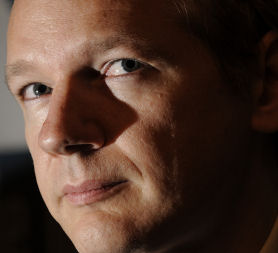WikiLeaks ‘under cyber attack’ ahead of US files release
Whistle-blowing website WikiLeaks has said it is under attack from hackers, just hours before it is set to release the latest batch of classified US documents.

The US has been bracing itself for the latest batch of files, which are expected to seven times larger than the files published by WikiLeaks in October on the Iraq war. The October release was the largest classified military leak in history.
The website said on social media website Twitter that they were under “mass distributed denial of service attack”, and confirmed that five newspapers in different countries will publish the US embassy cables tonight.
Details will be released in Spain’s El Pais, France’s Le Monde, Germany’s Speigel, the Guardian in the UK and the New York Times.
It is believed that the documents will contain some unflattering US administration assessments of David Cameron and Gordon Brown.
The Guardian journalist Simon Hoggart said the publication would be an “embarrassment” for the Prime Minister.
“It is going to give the candid American views of world leaders and indeed the reverse too,” he told BBC1’s The Andrew Marr Show.
“There is going to be some embarrassment certainly for Gordon Brown but even more so for David Cameron who was not very highly regarded by the Obama administration or by the US ambassador here.”
Julian Assange: hacking on the electronic frontier
The WikiLeaks founder has taken investigative journalism into the electronic age.
But can he survive now that he has become the story?
Who Knows Who peers into the secretive world of Julian Assange.
Read more: Julian Assange: hacking on the electronic frontier
Over the last few days the US has been briefing allies around the world ahead of the WikiLeaks release.
The State Department’s senior lawyer Harold Koh has written to WikiLeaks founder Julian Assange. He warned that the publication of the documents could harm America’s standing by exposing secret military operations.
He was writing in response to a letter from Mr Assange and his lawyer about the safety of people who might be named in the files. Mr Koh said the US would not co-operate or negotiate with WikiLeaks.
Last night, former British diplomat Carne Ross, who resigned from the Foreign Office over the invasion of Iraq, warned of the problems associated of these mass releases of documents.
“I think these telegrams are written, certainly in the British Foreign Office, on the understanding that they won’t be public. So, ambassadors and officials say things that are really very candid in them that you would not find ministers admitting publicly.
“If these document come out, if there is a culture that documents like this will be leaked in future, I think that diplomats and officials will stop writing these kinds of things down. That will have negative consequences for the operational effectiveness of government.”
He said that there was a need for greater accountability and transparency, but said: “One of the problems with the WikiLeaks approach is that this vast amount of information is released and we don’t really know what effect that will have. This needs to be done in a responsible, managed way through parliament, through the mechanisms of democratic accountability.”